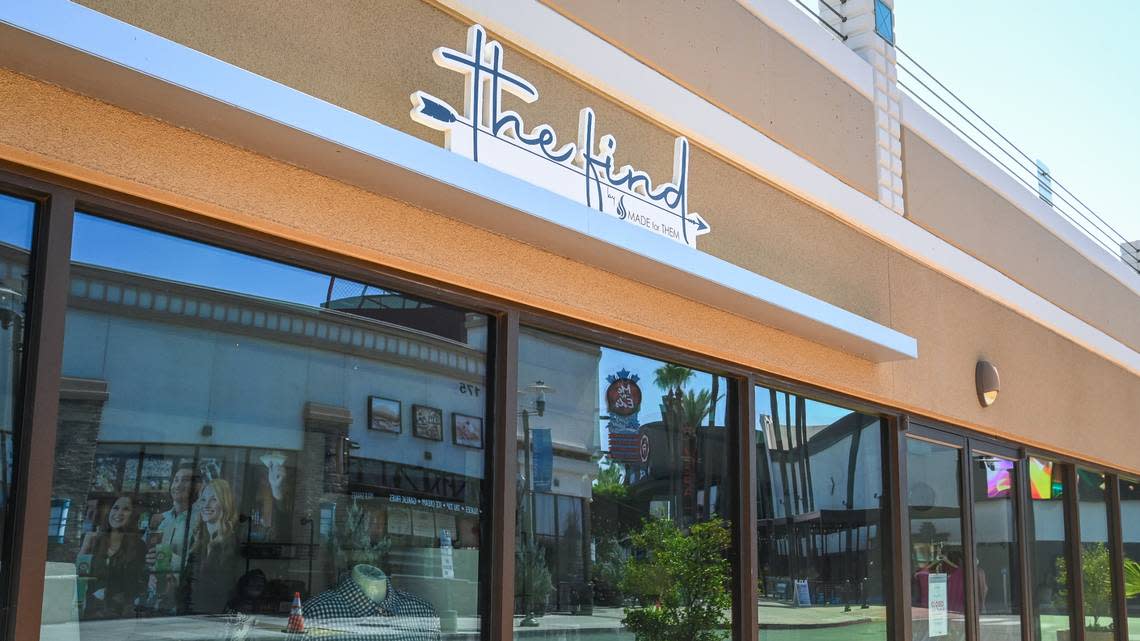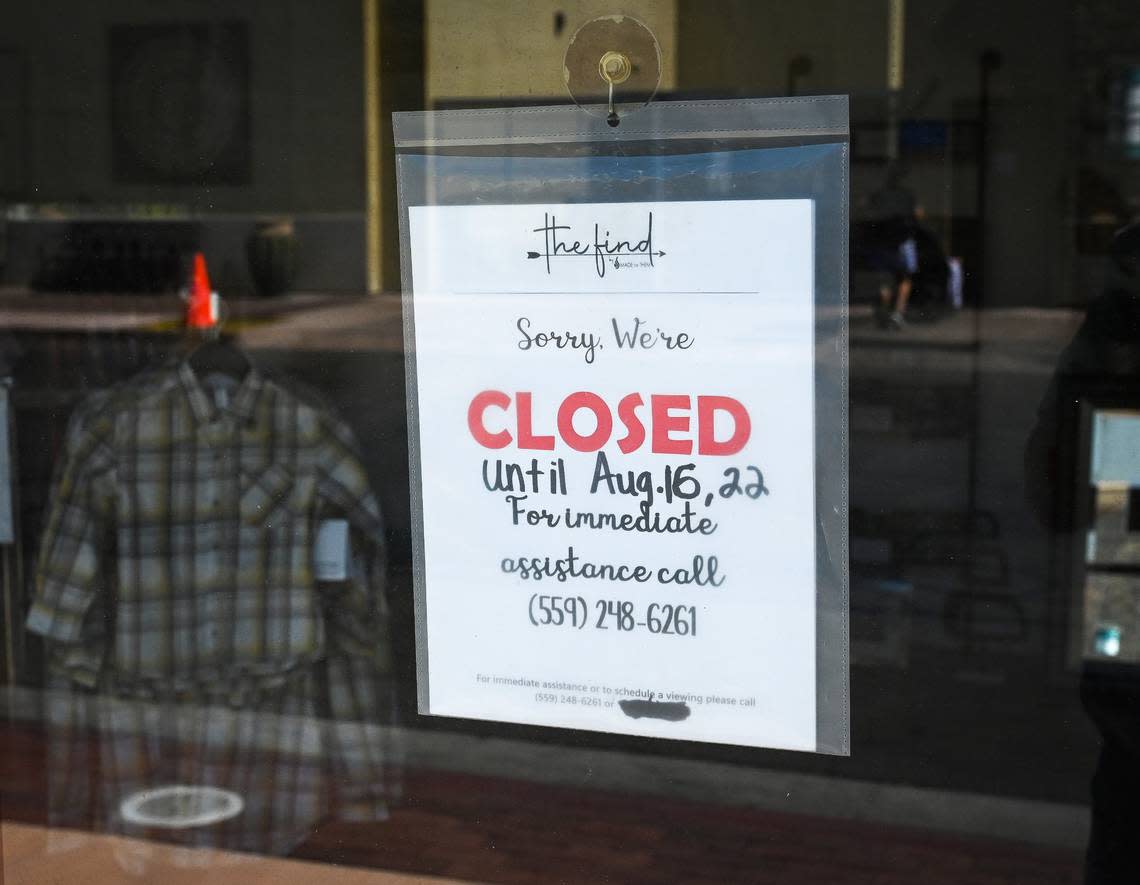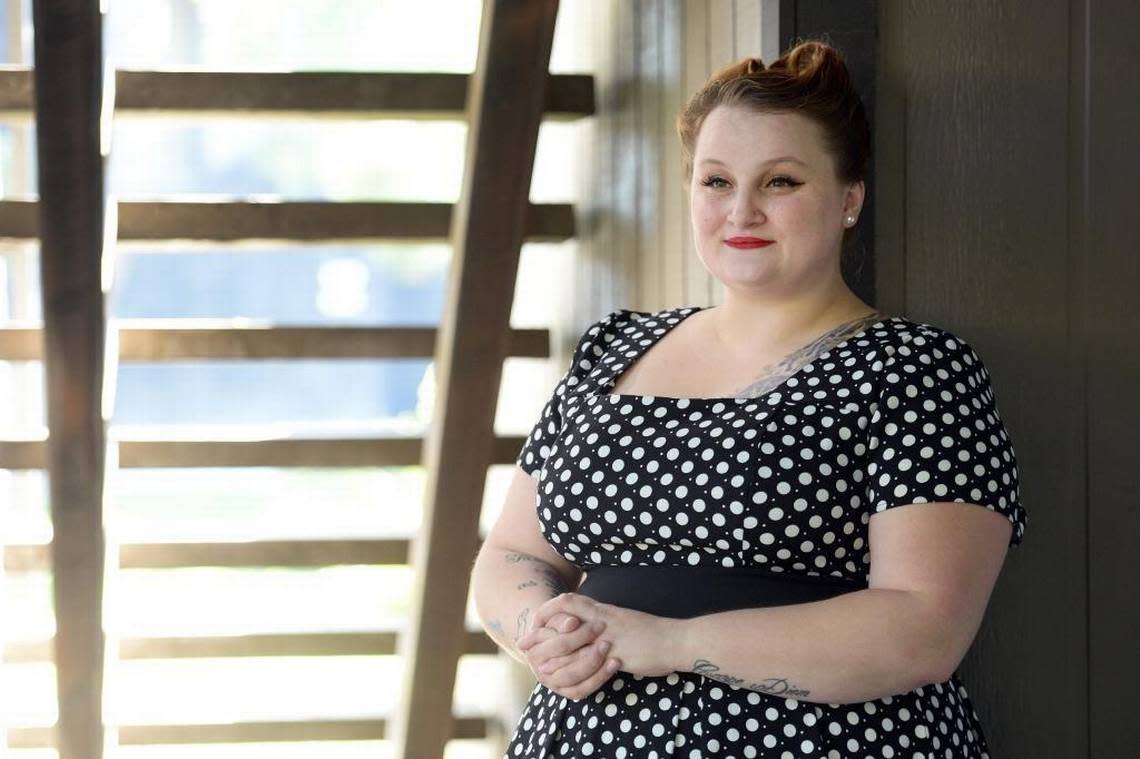Human trafficking survivors wanted help but got hurt. Fresno nonprofit closes – for now
A Fresno organization created to help survivors of human trafficking closed its doors following allegations of exploitation, wage theft, mismanagement, embezzlement, and fraud, including improper operations during a time when Made For Them’s tax-exempt nonprofit status was revoked by the state.
The partial closure of Made For Them came just days after information compiled by one of its leaders was shared with the California Attorney General’s Office and Fresno Police Department earlier this month.
That leader, Ashleigh Rocker Greene, Made For Them’s associate director, and more briefly, its interim executive director, said she was motivated to investigate after former clients of the organization posted videos on YouTube earlier this year about how Made For Them “re-exploits.”
California Assemblyman Jim Patterson, R-Fresno, and his staff are among the strongest supporters of the survivors who spoke out against Made For Them.
“I have gotten to know these women. I really care about them, and I believe them,” Patterson said of the Central Valley Thriver Council members, who shared videos in February and March about how they were hurt by Made For Them. “And they need to be believed, because they’re telling the truth.”
One of those survivors, Arien Pauls-Garcia, said Made For Them has not done enough to right the wrongs of the past, and that “once again, they are not acknowledging the hurt that they’ve done to the survivors, the defrauding of our community and donor base.”
Made For Them described itself a number of ways over the past decade, including combating human trafficking “through design, fashion and the arts,” and providing services to “heal, empower and employ” survivors in a “Christian environment.” Its founder, Andrea Shabaglian, also an event planner, held many large Made For Them fundraiser galas, supported by many Fresno leaders and businesses.
Human trafficking is often described as the sale of victims for sex, or labor services, through force, fraud or coercion.
Employees fired, board resigns, Shabaglian ‘restructuring’
A couple days after Rocker Greene filed her report with law enforcement, Made For Them’s volunteer board responded by firing her and all employees, then resigning.
Shabaglian was made board chair after she resigned as executive director this summer at the board’s request, said Oliver Baines, a former Fresno City Council member who is among those who recently resigned from the board.
Shabaglian’s new role wasn’t shared publicly, or even with Rocker Greene, who became Made For Them’s interim executive director in July.
At the start of last week, then-Board President Tiffany Mangum emailed “letters of separation” for Rocker Greene and two other employees that said the organization “must be restructured so that one day, it can be the presence in the community it was created to be,” and to do that, “all positions must be eliminated.”
Baines said board members resigned after they “laid off,” not fired, employees because there wasn’t money to pay them. The separation letters, dated Aug. 12, said Made For Them “faced extremely challenging times” without explaining the challenges, thanked them for their good work, and wished them continued success.
Mangum confirmed she is no longer on the board. Baines said Board Treasurer Chenecua Dixon also recently resigned. Board Secretary Melissa Moradian resigned on Aug. 3, after Rocker Greene sent the board many questions and concerns, emails show. All of them are still listed on Made For Them’s website.
“There wasn’t really enough clarity about these issues that were going on,” Baines said of his decision to resign.
After The Bee asked Shabaglian early last week about recent allegations, she responded in a text message: “We appreciate the opportunity to share. The board is preparing a letter to donors and partners and will get something to you,” and directed questions to a board email.
There was no mention of board resignations then or this week, when statements signed “Made For Them Board of Directors” were shared – or her new role on the board.
The Made For Them statement posted on social media Tuesday, addressed to “Donors, Stakeholders, and Partners,” started on a cheery note: “As you know, Made For Them just celebrated our 10-year anniversary!” It didn’t address any of the serious recent allegations, but emphasized the board “made the difficult, yet healing decision” to restructure “for a greater impact long-term.” The statement described a “pause” to direct services for its 18-month workforce re-entry program that started in 2020, but the continuation of a volunteer street outreach program meant to prevent human trafficking and help victims.
When asked who wrote the statement, Shabaglian acknowledged that she is serving as board president through the “restructuring process” and said it was a collective response from her “small, yet dedicated” new board, whose members she declined to name.
Baines said he wasn’t aware of board members ever having access to the board email Shabaglian referred questions to, “or anything operational, for the most part.” Shabaglian said the former board president had access to the email, but now only she and another board member does.
Mangum, the previous board president, wrote, “I do not believe any of the previous Board members, including myself, have accessed the email to date.”
As for questions about the organization’s finances, Baines said, “Andrea’s always been in charge of the account. She’s the only person who would get money in and out of the account, to my knowledge.”
The board saw what Shabaglian presented during board meetings.
“Now of course a financial report could have potentially been manufactured for some reason,” Baines said, “but I wouldn’t have any reason to suspect it was.”
Baines said Shabaglian was recently installed as board chair because “she’s the founder.”
“In my opinion, I don’t know that the organization can be salvaged,” he continued, but “the former board felt strongly that she should have the ultimate say. Hey, if you want to rebuild it, you can do it, but it will be without us.”
Survivors allege exploitation, wage theft, lack of services
Six survivors, members of the newly-created Central Valley Thriver Council, spoke with The Bee about the five YouTube videos they made earlier this year. The survivors say they formed the council to share their stories and hopefully provide helpful recommendations to groups working to end human trafficking.
One of the council members, Joy Jones, said she worked as a Made For Them case manager in 2017 and 2018.
“She was telling everyone that we had access to the trauma-informed care,” Jones said of Shabaglian, “but there wasn’t proper access to psychological care, mental health care, physical well being – there wasn’t.”
Jones said along with Made For Them inaccurately presenting itself as a full-service trauma center, it was “not acting as an onramp, because survivors were not able to get connections for those outside resources. It was, ‘Here’s a number you can call,’ and that’s not really trauma-informed, and it’s not really what an organization like this is supposed to do.”
That reportedly changed more recently, years after the group got its nonprofit status in 2011. A February statement from Made For Them said “in response to many of the frustrations shared in the videos circulating,” services were improved, and “in 2020, we implemented trauma-informed practices through the creation of our CORE Academy and the onboarding of professionally trained staff.”
That was too little too late for many survivors and unaware donors connected with the group for years.
Survivors felt exploited, and said Shabaglian inflicted further trauma by asking them to share their human trafficking experiences during large events to raise money for services that were never provided to them.
The women said they also weren’t paid for much of the work they did for the organization. Jones said the issues go far beyond how Shabaglian chose to share their stories, “This is now labor trafficking.”
For survivor Rebecca Brown, that meant unpaid work providing food for Made For Them fundraisers. Brown said while other caterers were paid, her barbecue catering business was not.
Brown said she asked Shabaglian to be paid for “the money that I put into the food, the catering and the labor” but was told there wasn’t money available to pay her, and that Shabaglian thought the catering was donated as volunteer service.
Brown continued, “I wasn’t in a place at that time where I was able” – and stopped mid sentence, her eyes filling with tears.
Some fundraisers occurred when the organization’s nonprofit status was revoked, including its 10th anniversary gala in 2021 that grossed over $37,000, according to an income summary shared by Rocker Greene.
Made For Them also ran a home decor store, The Find, that opened in Fresno’s River Park shopping center last year. It took in nearly $180,000 in all through April – while the organization’s tax-exempt status was revoked – according to the income summary.
In years prior, Jones recalled, “Far too often than I care to admit, we would have offices and storage facilities that were filled to the brim with donated items that were meant for survivors and their children, and I was expressly told that we were not to hand out those items to survivors, and we were not to engage in any kind of ‘handouts,’ as she (Shabaglian) would call it, or freebies – despite the fact that they were things that were donated for survivors.”



Jones said when she was a Made For Them case manager, the organization had a “work readiness” program where survivors were supposed to be paid weekly for four hours of work, five days a week, making soap and jewelry.
“So they were only going to be eligible for those four hours of pay, even though they worked six or seven hours. That was already a problem, but the bare minimum, give them the four hours that you were contracted to give them,” Jones recalled, adding that when she worked there from 2017 to 2018, “I can confidently say not one survivor received an actual paycheck for the actual hours listed that they worked.”
Some of the survivors filed claims with the California Labor Commissioner’s Office, alleging wage theft. Pauls-Garcia said some of the claims are moving forward while others are hindered by a statute of limitations, the maximum amount of time legally allowed to file a claim after an alleged crime.
The women previously entered into a professional mediation with Shabaglian to address issues. They said she only attended one session, then refused to come to another that was scheduled, just before it was going to start.
The women said they are still waiting for an apology. Instead, they received “cease and desist” letters that called their videos airing grievances “libelous and slanderous.” Made For Them posted a statement on its Facebook page in February, pledging to “make efforts to meet these survivors’ needs for healing and reconciliation.” The share text added, “We do not respond to comments at this time.”
Survivor Dominique Brown said talking about Shabaglian hasn’t been easy.
“This person is like considered a friend,” Brown said. “This is somebody who walked alongside you, comes to your kids’ birthday parties, who uses our faith against us and prays with us, prays for us, attends family funerals, you know what I mean? Somebody who was very hands-on in your life.”
In an email to The Bee, Made For Them said, “We have gone to great lengths to ensure they feel heard and have taken their perspectives seriously” and that “we have sought them personally for reconciliation, and our doors remain open to them.”
Shabaglian said, “We believe that no one is a sum of their mistakes or past. We believe this for others, and we believe this for ourselves.”
Former Made For Them leader files reports with law enforcement
Rocker Greene said she was stirred to action by the survivors’ videos. She’s often thought of one testimony, Jamelia Hinds asking, “Do you see my heart?” after asking viewers to believe her trauma, that she got “abuse, misuse” from Made For Them, not help.
“I’ve watched that so many times, and it just breaks my heart. She’s like, ‘Nobody is listening to us, nobody cares. Everything is about facts and what you can prove, and what we’re talking about is how we feel and how we were treated and what our experience was,’” Rocker Greene said, paraphrasing the message she heard in Hinds’ words. “I absolutely believe that they deserve for that to be acknowledged by somebody inside of Made For Them, whether it’s Andrea herself or the board, but it’s clear to me they have no intention of doing that.”
Baines said “a lot of the accusations of the survivors couldn’t be supported ... it’s not nearly as cut and dry as people made it seem.”
Ryan Townsend, executive director of Central Valley Justice Coalition, who has supported the survivors, posed questions on social media that inspired Rocker Greene to further action, including: “If I was being accused of something that I was sure was untrue, then I would welcome an investigation from the authorities because it would vindicate me. If I was innocent then I would also welcome a full forensic audit of my organization’s bank account.”
Rocker Greene said there’s been no financial investigation, only a program audit looking at services to improve resources, which is supposed to be completed soon.
Rocker Greene started raising concerns and asking questions about Made For Them’s finances within days of taking the job. The figures she was given often don’t add up or make sense, she said. “How does cash flow in and out of MFT?” was one early question that never got answered. Rocker Greene previously worked as a program coordinator at Fresno State, and finished her master’s degree in business with an emphasis in public administration before joining Made For Them as its new associate director in October.
“I did not realize that things were being handled so poorly and this out of hand,” Shabaglian responded in November to Rocker Greene, who shared the email. “I take full ownership for not having a better awareness of so many missing and uncertain pieces, or maybe not wanting to be truthful about it, and not holding others accountable.”
Board meeting notes on file, shared by Rocker Greene, show there was an awareness of issues for a while.
Meeting minutes from Oct. 27 reference “things falling through the cracks for a while.” There are notes about a staff leader not doing what was needed to secure funding, giving a bank card to someone without letting Shabaglian know, lying, and wanting to “reconcile 2020 finances.” One board member was quoted saying most companies would respond with “immediate termination.” Made For Them discovered the staff leader also allegedly accidentally deposited a $6,000 donation into her personal account and spent it. Made For Them leaders let her pay it back in installments, according to emails.
This staff leader is no longer employed by Made For Them and was not among the employees fired this month – two of them, including Rocker Greene, were introduced as new hires during the October board meeting. It was a shocking start.
As Rocker Greene was working to get Made For Them’s nonprofit status back – what she said was restored in April after it had been revoked for two years – she recommended an internal investigation of the accounts, what she said never happened. She also expressed concerns that the apparent $6,000 embezzlement was not reported to the state, and fears that more was amiss.
Earlier in 2021, this same staffer and Shabaglian reportedly received substantial raises totaling $54,000 between the two, apparently increasing their annual salaries to $55,000 and $65,000, respectively, according to meeting minutes and Rocker Greene.
Rocker Greene was surprised to learn they spent time getting raises instead of getting their tax-exempt nonprofit status restored, “making sure that that compliance paperwork got filed and was accurate and audited – that stuff matters.” Rocker Greene said she recognizes it costs a lot to run a nonprofit, but more money is supposed to go toward programs than salaries, and that wasn’t happening.
In her whistleblower complaint to the attorney general’s office this month, Rocker Greene wrote Made For Them continued to solicit the public for donations while its tax-exempt status was gone between March 2020 and April, and that it received more than half a million dollars over those two years, with more than $294,000 of that going to pay employees. Rocker Greene asked the office for an investigation “pertaining to illegal solicitation, fraud, deception, theft, misuse of assets, compliance violations of Articles of Incorporation & falsified statements.”
On Tuesday, Rocker Greene also filed a report with the IRS, alleging Made For Them didn’t properly report and manage funds received.
Rocker Greene said about a dozen former employees, volunteers, and leaders of Made For Them reached out to her this month to share horror stories of their own.
Other issues involving Made For Them:
Court documents show Shabaglian settled a lawsuit for $50,000 last year that named her and Made For Them as defendants in a case regarding a 2016 multi-vehicle accident caused by a chair that flew out the back of her pickup truck.
Survivors said they wrote and performed a song with Shabaglian’s husband, who sold the song but didn’t share the profits.
Rocker Greene said Made For Them moved its office many times, and that she helped with one move out of a church campus last year. Board meeting notes from September reference the organization deciding not to meet with that church’s legal counsel again, citing “unreasonable response/requests,” and a plan to move their office to another faith-based center – which Made For Them has to vacate at the end of this month when its lease expires, Rocker Greene said.
Where’s the accountability? Looking into nonprofits
Allegations remain under investigation by various agencies. Baines said he hasn’t been contacted by law enforcement concerning the claims.
An obvious violation was operating while Made For Them’s nonprofit status was recently revoked for 25 months. A California Franchise Tax Board listing showed the organization lost its tax-exempt status in March 2020, a suspension also noted by the California Secretary of State.
Patterson’s office stressed that nonprofits must file information yearly with state agencies to maintain their tax-exempt status, and if that status is lost, a nonprofit “should no longer be operating at all – much less raising money.”
Charity Navigator, a charity assessment organization, also gave Made For Them a failing score, 45 out of 100, in the area of “finance and accountability.” Patterson described that as Charity Navigator concluding “there is a serious deficiency between what they raise and what they spend on the services for victims.”
“When you roll all of that together,” Patterson said, “the women yearning and pleading to be believed, their claims that they were supposed to be paid but weren’t, and now they have wage claims in front of the state labor board – that is going to result in a hearing.”
He met many survivors through his work as author of AB 262 that went into effect in January – changes in California law that make it easier for victims of human trafficking to have their records cleared of non-violent crimes.
Rocker Greene is hoping the state will audit Made For Them’s finances, but said that oversight is unfortunately not standard practice for nonprofits making less than $2 million a year.
“So it’s just expected that you be good stewards of your money ... so the IRS could audit us, but it would cost more money than they would probably find out was taken” and the IRS doesn’t want to waste taxpayer money, Rocker Greene said.
She said that issue interests her much more than getting an organization in trouble for bad management.
“It’s an important conversation to have,” Rocker Greene said. “Why do we have regulations if there’s no way to hold anybody accountable to them?”
She doesn’t think Shabaglian meant to hurt people, but said she did.
“Nobody evaluated her. Nobody held her accountable. They let her run it like it was her own personal business, and that was to the detriment of her leadership,” Rocker Greene said. “That hurt her just as much as it hurt the survivors, unfortunately.”
“Andrea came from event planning into the nonprofit space,” Townsend said, “and so she was very good at planning and conceiving and executing events that people loved to be a part of. But most of us, we couldn’t see beneath that shiny surface to know what was really going on.”
Townsend of the Central Valley Justice Coalition was among those issued a cease and desist letter for supporting the survivors and sharing their videos. Pauls-Garcia also works for the coalition that helps prevent human trafficking as a program manager. She said she shared her experiences as a survivor and member of the new Central Valley Thriver Council.

They said speaking up was about justice, not competition among groups. From a public relations standpoint, it hurt, not helped, the Central Valley Justice Coalition, Townsend said.
“In speaking out about another organization, it feels like people are more upset with me for that than they are for what actually happened to these survivors and the people that have been hurt in the process of Made For Them operating,” Townsend said.
He said he hopes the community continues to support many organizations working to end human trafficking because there’s still a big need. Townsend said data shows there were 495 reported cases of human trafficking across the Central Valley in 2021, and 1,150 victims identified in the region since June 2020.
Pauls-Garcia said she hoped what she shared about Made For Them would lead to her being involved in more discussions with local groups, but has instead felt in the dark, like a child “being forced to sit in the sandbox” while “the adults handle it.” She thinks many see her and other survivors who spoke up as “traumatized women with a grudge who want to extort people.”
It’s been a painful year for them, waiting for something to happen.
In a February video, Hinds asked why people are OK with victims continuing to be victimized.
“If you can arrest a victim of human trafficking, why are you not holding an organization leader (accountable) who is misusing and exploiting and taking advantage of victims who are supposed to be getting healing,” Hinds asked, “and getting services to better their life, and to get into the independence that they deserve, and that every American that walks on this land is entitled to!”
